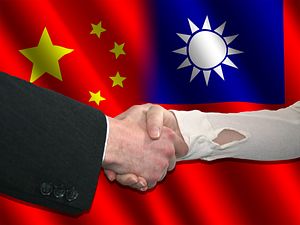As Wang Yu-chi, minister of Taiwan’s Mainland Affairs Council (MAC), gets ready to depart for Nanjing next week, his remarks have once again ignited speculation that an even more historic meeting is in the cards. Wang initially tried to downplay the possibility that Taiwanese President Ma Ying-jeou might meet with Chinese President Xi Jinping, knowing that such a meeting would be extremely controversial on the island. However, he seemed more willing to discuss the topic during a recent meeting for Taiwanese business leaders.
According to an Agence France-Presse report run in South China Morning Post, Wang repeated his promise not to raise the subject of a meeting between Ma and Xi. However, this time he added an additional clause: “If they did (meet), we think the APEC leaders summit would be the best venue.” Taiwan’s state news agency CNA noted that, because the APEC summit participants are only described as “leaders” (rather than official titles), “the MAC believes makes it a fitting forum for the “leaders” of Taiwan and China to interact with each other on an equal and reciprocal basis.” The CNA report also emphasized that Wang would only offer up this suggestion “if Chinese representatives initiate discussion of a Ma-Xi meeting.”
A meeting between Ma and Xi would be an historic step in closer cross-strait ties, and as such would have to overcome domestic opposition from within Taiwan. At a recent talk held at the Center for Strategic and International Studies in Washington, DC, Joseph Wu, the opposition Democratic Progressive Party’s representative to the U.S., urged Taiwan to be “very cautious” about setting up such a meeting. Wu cautioned that Beijing might try to use such a summit to set preconditions for cross-strait relations or to force a joint statement that might force Taipei to cede too much. Taiwanese academics have also noted that Ma Ying-jeou’s own conditions for such a meeting (national need, support from the Taiwan public and maintenance of national dignity) have not been met.
Interestingly, a meeting on the sidelines of an APEC summit could actually work in Taiwan’s favor. Taiwan’s president is currently barred from attending the APEC leaders’ meeting because of Beijing’s opposition. Instead, Taiwan must send unofficial, retired government representatives such as former vice presidents Vincent Siew and Lien Chan. Given Ma Ying-jeou’s emphasis on integrating Taiwan into regional economic structures, his attendance at the APEC meeting would set an important precedent even apart from a potential meeting with Xi Jinping. It could potentially open the way for increased Taiwanese participation in APEC.
The 2014 APEC Economic Leaders’ Week will not begin until November 10, providing some time for negotiations (and media speculation) over a potential Ma-Xi meeting. Coincidentally, the 2014 APEC summit will be hosted by Beijing this year, adding another complicating layer to the possibility of a Ma-Xi summit.

































